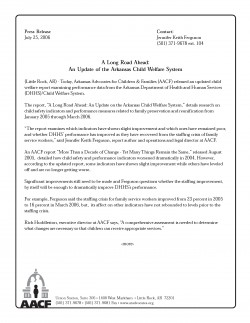
Today, Arkansas Advocates for Children & Families (AACF) released an updated child
welfare report examining performance data from the Arkansas Department of Health and Human Services (DHHS)/Child Welfare System.
The report, “A Long Road Ahead: An Update on the Arkansas Child Welfare System,” details research on child safety indicators and performance measures related to family preservation and reunification from January 2005 through March 2006. “The report examines which indicators have shown slight improvement and which ones have remained poor, and whether DHHS’ performance has improved as they have recovered from the staffing crisis of family service workers,” said Jennifer Keith Ferguson, report author and operations and legal director at AACF.
An AACF report “More Than a Decade of Change – Yet Many Things Remain the Same,” released August 2005, detailed how child safety and performance indicators worsened dramatically in 2004. However, according to the updated report, some indicators have shown slight improvement while others have leveled off and are no longer getting worse. Significant improvements still need to be made and Ferguson questions whether the staffing improvement, by itself will be enough to dramatically improve DHHS’s performance. For example, Ferguson said the staffing crisis for family service workers improved from 23 percent in 2005 to 16 percent in March 2006, but, its affect on other indicators have not rebounded to levels prior to the staffing crisis.
Rich Huddleston, executive director at AACF says, “A comprehensive assessment is needed to determine what changes are necessary so that children can receive appropriate services.” Part of that comprehensive assessment would include looking at DHHS’s current budget, the services provided and the staffing structure, according to Huddleston.
“How long can children wait to have a system in place to improve their well-being. Children need a nurturing and loving environment to grow. Neglect not only impacts their physical health, but also their emotional and social development,” said Ferguson. “These children rely on public intervention to help them, and with the appropriate services, they can grow up to live healthy and productive lives.”
Some of the report’s other findings include:
- Only 47 percent of maltreatment assessments are concluded within 30 days after an allegation of maltreatment is made compared to 80 percent in 2000.
- The percentage of foster children receiving no monthly visits from caseworkers is 56 percent.
This indicator continues to be poor even after DHHS changed the policy to reduce the number of home visits from weekly to monthly.
